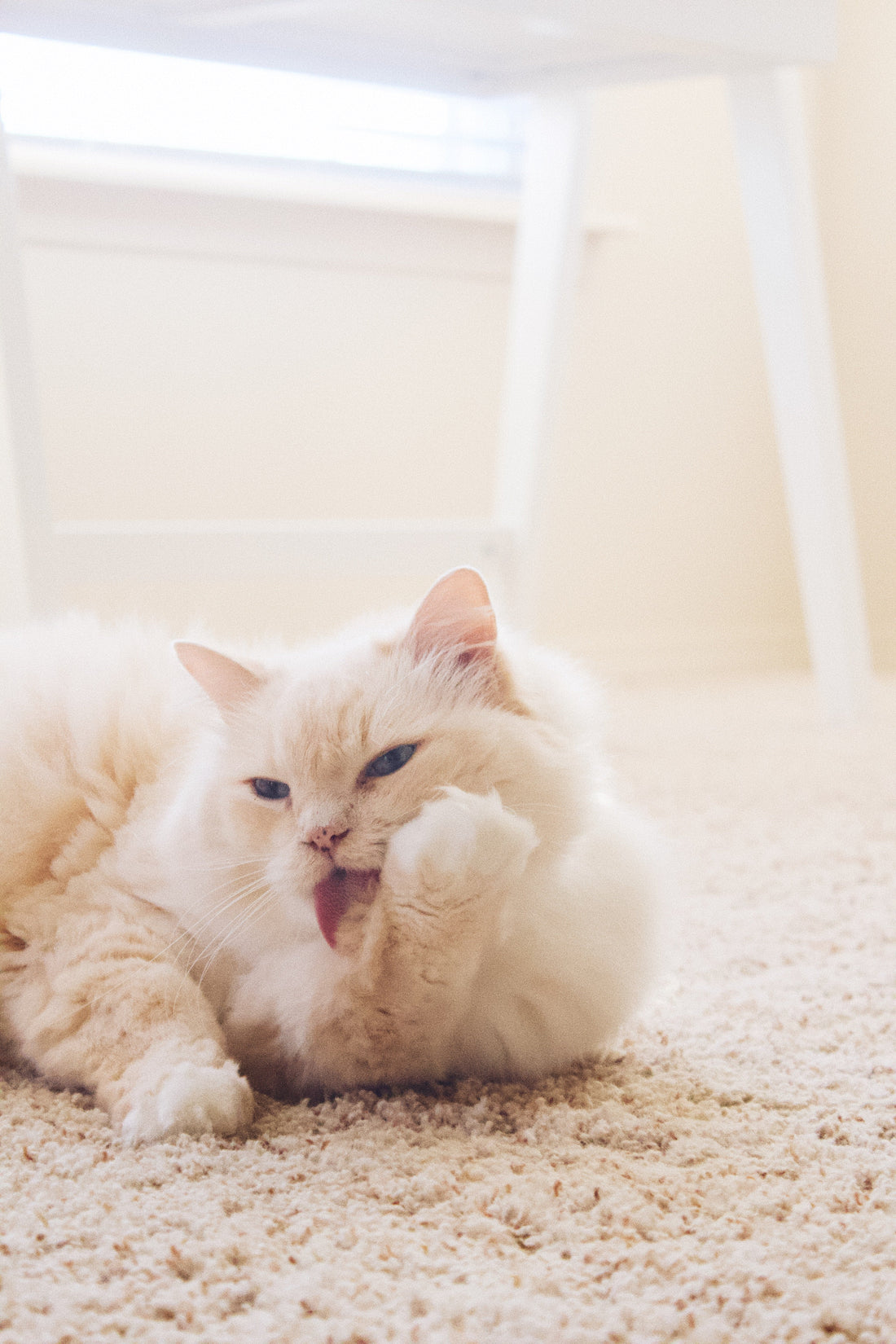
Vomiting and Hairballs - The Ultimate Cat Guide
Share
Why do cats get hairballs in their cat's digestive system?
Most indoor cats spend 60% of their day grooming themselves or their friends, which leads to the formation of cat hairballs. These hairballs form in the cat's stomach from dead hair that is ingested during grooming. Grooming keeps them clean, soothes them, calms them, and cools them (through evaporation) when the temperatures rise. All this grooming is what causes the dreaded hairballs which can cause vomiting…. those painful looking, gut-wrenching vomit spells….poor fur babies!
Sometimes the cats will have a hard time expelling the hairball and will go in search of things like the cardboard from your toilet paper roll or chewing on your houseplants? Many times this is because your cat craves fiber… or maybe your cat is just having fun unraveling your toilet paper, but that’s not always the case. Cats have a knack for searching out what they need, unfortunately what they find is not always safe. Growing your own cat grass inside your home is a perfect solution.

Cat Wellness: Minimizing Hairballs and Vomitting
Cat owners understand that alongside the joy of feline companionship, there are certain challenges unique to our whiskered friends. Vomiting and hairballs are common issues that can be unsettling for both pets and their human counterparts. In this ultimate cat guide, we delve into effective strategies to minimize these occurrences, ensuring your cat's overall well-being.
Understanding the Root Causes: Vomiting and hairballs often result from a cat's meticulous grooming habits. While grooming is a sign of a healthy cat, it also means they ingest a significant amount of fur. This hair can accumulate in their stomach, leading to the formation of hairballs or trigger occasional vomiting. Identifying the root causes is the first step towards managing and preventing these issues.
Grooming Practices: Regular grooming can significantly reduce the amount of loose fur your cat ingests. Invest in a high-quality cat brush suitable for your cat's coat type, and establish a grooming routine that both you and your cat find comfortable. By removing excess fur through brushing, you can minimize the likelihood of hairballs and vomiting.
Dietary Considerations: A well-balanced and high-quality diet plays a crucial role in preventing hairballs and reducing vomiting. Look for cat foods that include fiber to aid digestion and help hair pass through your cat's digestive system. Additionally, consider specialized cat foods formulated to address hairball issues, which often contain ingredients to support hairball control.
Hydration Matters: Ensuring your cat stays adequately hydrated can contribute to a healthier digestive system. Water helps move ingested fur through the digestive tract, preventing it from clumping and forming hairballs. Consider incorporating wet cat food into your pet's diet or providing access to fresh water at all times.
Incorporating Cat-Friendly Treatments: There are various over-the-counter remedies designed to assist in reducing hairballs. These treatments often come in the form of flavored gels or treats that help lubricate the digestive tract, making it easier for hair to pass through. Always consult with your veterinarian before introducing any new supplements or treatments to your cat's routine.
Growing your own cat grass:
Growing your own cat grass actually helps aid their digestion by providing a number of vitamins and minerals and helps prevent hairballs from forming by adding fiber. It also keeps your cat from seeking pesticide ridden grass outdoors or poisonous indoor houseplants, or your toilet paper roll. The fiber helps ease an upset stomach. Cats also need folic acid (vitamin B9) which helps aid digestion and is found in cat grass but not toilet paper rolls, what a coincidence!
While Cat grass helps prevent hairballs it can also induce vomiting for good reasons, maybe your cat has an allergic reaction to a certain food or your cat has simply scarfed down some indigestible matter. The fiber in the cat grass helps rid their system of any potential toxins.
As cats get older their metabolism slows down just like us, this can cause constipation and tummy pains and if you can imagine.... a hairball on top of all that. Whether your cat is in need of hairball relief, vitamins or just has a sensitive stomach cat grass is a perfect solution. And believe it or not this goes for more than just our furry cat friends but dogs, rabbits, guinea pigs, reptiles and more pets we love can all benefit from the nutritional value found in cat grass.
SHOP CAT GRASS

Note: If your cat is coughing or gagging regularly, never just assume that it’s a hairball. If you’re in any doubt, always have a chat with your vet.
FAQ's
1. Why does my cat vomit hairballs?
Cats groom themselves frequently, and in the process, they swallow loose hair. Most of this hair passes through their digestive system, but some may form hairballs, which are then vomited up.
2. How can I help reduce hairballs in my cat?
You can help reduce hairballs by regularly grooming your cat to remove loose fur, providing a hairball control diet, and offering hairball remedies that aid in digestion.
3. Is frequent vomiting of hairballs normal for cats?
Occasional hairballs are normal, but frequent vomiting can indicate an underlying issue. If your cat vomits more than once or twice a week, it's best to consult a veterinarian to rule out other health problems.